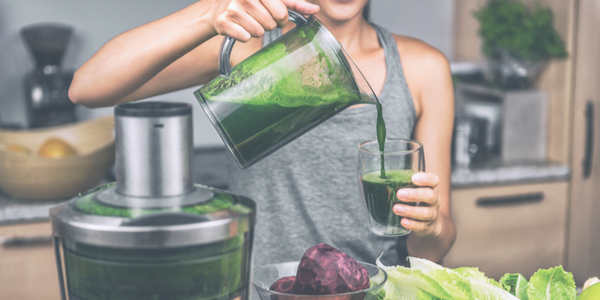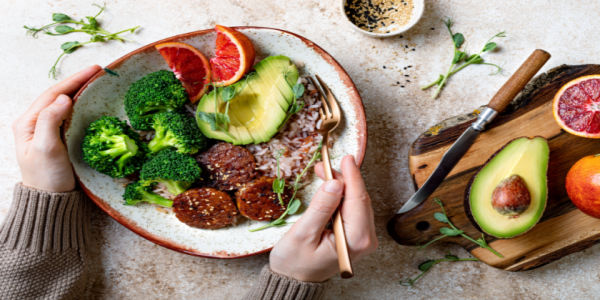
It is widely recognized adding fruits and vegetables to the diet can offer many health benefits. However, despite recognizing this, most Americans do not get the recommended amount of fruits and vegetables.
One trendy and popular way to get more fruits and vegetables is to juice them with a home juicer. The nutritional benefits of juicing can be touted for overall health as well as promoting weight loss. In fact, exclusively juicing can sometimes be portrayed as a healthy way to lose weight. Other perceived benefits of juicing include removing toxins, benefiting digestive health, and boosting the immune system.
Is juicing for health supported by science, though? Are there true nutritional benefits of juicing or is it better to skip this diet trend? Dive into the pressing truth about both the benefits and concerns of juicing.
4 Nutritional Benefits of Juicing
On one hand, these are the potential benefits of juicing fruits and vegetables supported by scientific evidence.
1. Increased Nutrients
Drinking fresh-pressed juice can increase vitamin, mineral, and antioxidant intake. This especially serves true for those who struggle to consume the recommended five to 13 servings of fruits and veggies per day for whatever reason.
Juicing can provide a good source of B vitamins, vitamin A, C, K, and potentially calcium and iron if vegetables are used. Thus, one of the main nutritional benefits of juicing is the boost in these vital nutrients.
2. Helpful for Chewing or Swallowing Difficulties
Noshing on raw, whole fruits and veggies is not always a feasible option for those displaying chewing or swallowing difficulties, whether from age, disease state, or temporarily after dental procedures.
In these instances, sipping on juice can offer the beneficial nutrients of fruits and vegetables while lessening the risk of irritating the mouth, aspiration, or choking.
3. A Pleasing Way to Introduce New Fruits and Vegetables
Even if you do not have chewing or swallowing issues, some picky eaters - young or old - may simply not want to eat certain fruits and vegetables. Juicing can be one way to introduce new fruits and vegetables that are more palatable and enjoyed by all.
4. Benefit Blood Pressure
A high intake of fruits and vegetables is one of the key components of a diet to help support heart health. Additionally, WebMD suggests a scientific benefit of juicing is the positive effect it can have on blood pressure.
Juicing fruits and vegetables provides a good source of nitric oxide. One digested, nitric oxide, in turn, dilates blood vessels which leads to lowered blood pressure. Specifically juicing beets (with other desired fruits and vegetables) can provide a high source of nitric oxide.
5 Reasons of Concern for Juicing
On the other hand, what juicing does for your body is not all positive. Here are some potential concerns that may warrant caution with pressed juice.
1. Lacks Fiber
While some individuals need to follow a low-fiber diet for health reasons, most people need to get more fiber in the diet. While a benefit of juicing is the vitamins, minerals, and antioxidants it provides, a downside of juicing is that it lacks fiber naturally found in fruits and vegetables.
A main benefit of eating whole fruits and vegetables is the fiber they provide. Juicing eliminates almost all the fiber from fruits and vegetables which can be a concern for most people.
An alternative to juicing that still comes in liquid form but provides fiber is to blend fruits and vegetables instead of juicing. For example, morning blender smoothies can be made in minutes and contain whole fruits and vegetables.
2. Not a Balanced Meal Replacement
Some weight loss plans suggest drinking fresh-pressed juice as a meal replacement. However, this advice is not backed by science.
Juice is not a meal replacement, as it is low in key nutrients including fiber, protein, and healthy fats. Trying to drink fresh juice in place of a meal will leave you feeling hungry soon after and not provide adequate, balanced nutrients for meals.
3. Can Spike Blood Sugar
Due to the lack of fiber, drinking juice will spike blood sugar more than eating whole fruits and vegetables. The concentrated sugar source makes it especially problematic for those managing diabetes.
One way to lower the sugar load of juice is to use more vegetables in juice instead of all or mostly fruits.
4. May Not be Helpful for Weight Loss
While juicing can be touted for weight loss, it actually may have the reverse effect depending on how much juice is consumed and what the rest of the diet looks like.
An eight-ounce serving of fruit juice can provide between 100-180 calories. Depending on serving size, juicing could actually be adding more calories to the diet than suspected.
One way to avoid this potential oversight is to balance juicing with the intake of whole fruits and vegetables. If juicing, mix vegetables with fruits instead of just blending fruits.
5. Potential Bacteria Growth
Surprisingly, juice has the potential to make you sick. Juices not refrigerated or consumed within 72 hours can harbor bacteria, posing the danger of a foodborne illness.
To lower this foodborne illness risk, be sure to clean a juicer thoroughly after use. Wash fruits and vegetables thoroughly before juicing. Only make enough juice for one day at a time. If purchasing commercially made juice, pasteurized juice will have a lower risk of bacterial contamination.
Bottom Line: Scientific Benefits of Juicing
Ultimately, juicing is not the automatic answer to your weight loss dreams, nor does research indicate it as a healthier alternative to eating whole fruits and veggies.
However, it may help some people reach the recommended servings of fresh fruit and veggies if whole fruits and vegetables are not eaten enough, whatever the reason may be. Juicing may also be beneficial for lowering blood pressure, but note eating whole fruits and vegetables can also provide heart health benefits.
Juicing eliminates fiber naturally found in whole fruits and vegetables and can therefore spike blood sugar and potentially be a concentrated source of calories.
If interested in juicing for health in a way that benefits health, find a more detailed guide here, along with incorporating protein and healthy fats into the diet. But if desiring weight loss assistance and gaining health benefits in a nourishing and sustaining fashion...
Explore bistroMD's program options! Being the nation's leading weight loss meal delivery service, bistroMD offers well-balanced meals straight to your doorstep.
Each meal is doctor-designed, dietitian-approved, and chef-prepared and contains 1,100 to 1,400 calories daily with 40 to 50 percent of total caloric intake from lean, adequate protein, 20 to 25 percent of calories from healthy fats, and 30 to 35 percent from complex carbohydrates.
The wholesome balance of nutrients provides the body with what it needs to jump-start healthy weight loss!
References:
Brennan D. Juicing: Is it good for you? pros and cons, nutrition, and more. WebMD. Published October 28, 2020. https://www.webmd.com/diet/juicing-health-benefits#1.
Zeratsky K. What to know before you juice. Mayo Clinic. Published October 9, 2021. https://www.mayoclinic.org/healthy-lifestyle/nutrition-and-healthy-eating/expert-answers/juicing/faq-20058020.







